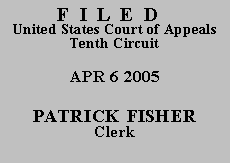

|
MICHAEL MACKEY,
v.
RON WARD; MIKE MULLIN,
individually and in their official
capacity |
|
Before BRISCOE, LUCERO, and MURPHY, Circuit Judges.
Proceeding pro se, state prisoner Michael Mackey appeals the district court's dismissal of the civil rights claims he brought pursuant to 42 U.S.C. § 1983. Mackey and four other inmates filed an amended § 1983 complaint on May 4, 2004 containing allegations that Defendants deprived them of their constitutional rights in violation of the First Amendment by refusing to allow them to purchase television sets. Defendants filed a motion to dismiss Mackey's claims, arguing that he had not exhausted his administrative remedies through the Department of Correction's Grievance Process (the "Grievance Process"). See 42 U.S.C. § 1997e(a) ("No action shall be brought with respect to prison conditions under section 1983 of this title, or any other Federal law, by a prisoner confined in any jail, prison, or other correctional facility until such administrative remedies as are available are exhausted."); Booth v. Churner, 531 U.S. 731, 741 (2001).
Mackey argued that exhaustion was futile because a provision in the Grievance Process permits the reviewing authority to place an inmate on a grievance restriction if the inmate is found to have abused the process. An inmate may be found to have abused the grievance process if, inter alia, there are "repetitive grievances [filed] by multiple inmates about the same issue." Mackey argued that he was subject to the restriction because two of the other plaintiffs had already filed grievances on the same issue. The district court rejected Mackey's argument that exhaustion was futile, granted Defendant's motion, and dismissed Mackey's claims. The court also entered a Rule 54(b) certificate and Mackey brought this appeal.
This court reviews a dismissal for failure to exhaust de novo. See Miller v. Menghini, 213 F.3d 1244, 1246 (10th Cir. 2000). On appeal, Mackey admits that he did not exhaust his administrative remedies but asserts, as he did before the district court, that restrictions on his use of the Grievance Process render administrative remedies unavailable. Mackey's conclusory allegations that pursuit of administrative remedies would be futile, however, are insufficient to excuse his failure to exhaust. Although we conclude that the district court did not err when it dismissed Mackey's claims, the court should have dismissed those claims without prejudice. See Ross v. County of Bernalillo, 365 F.3d 1181, 1190 (10th Cir. 2004) ("If a prisoner does submit a complaint containing one or more unexhausted claims, the district court ordinarily must dismiss the entire action without prejudice."); Yousef v. Reno, 254 F.3d 1214, 1216 & n. 1, 1222-23 (10th Cir. 2001).
Accordingly, we affirm the district court's dismissal of Mackey's claims but remand to the district court to vacate its entry of judgment in favor of Defendants and to, instead, dismiss Mackey's claims without prejudice. Mackey
is reminded that he remains obligated to continue making partial payments until his appellate filing fee is paid in full. See 28 U.S.C. § 1915(b).
ENTERED FOR THE COURT
Michael R. Murphy
Circuit Judge
*. This order and judgment is not binding precedent, except under the doctrines of law of the case, res judicata and collateral estoppel. The court generally disfavors the citation of orders and judgments; nevertheless, an order and judgment may be cited under the terms and conditions of 10th Cir. R. 36.3.